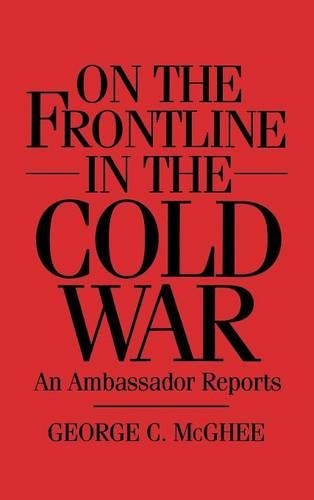
On the Frontline in the Cold War: An Ambassador Reports
(Hardback)
Publishing Details
On the Frontline in the Cold War: An Ambassador Reports
By (Author) George Mcghee
Bloomsbury Publishing PLC
Praeger Publishers Inc
28th January 1997
United States
Classifications
Tertiary Education
Non Fiction
International relations
909.825
Physical Properties
Hardback
240
Width 156mm, Height 235mm
510g
Description
The Cold War, which started in 1947, resulted from the United States' gradual discovery that the Soviets, allies during World War II, were enemies, hostile to non-Communist nations and determined to spread Communism wherever they could. The Soviets feared another revival of German nationalism and sought to defend themselves against another German invasion. The U.S. and its allies created NATO to balance a Soviet military buildup, including the nuclear arms race. The first confrontation with Communist guerrilla action in Greece and Soviet threats against Turkey were followed by Communist party threats to overthrow democratic governments in France and Italy and later all around the world. The U.S. supplied vast military and economic assistance to thwart their efforts. The Soviet government, consequently, felt obliged to assist governments whom they considered threatened by the imperialists, principally the United States. In this insider's account of the Cold War, Ambassador George McGhee outlines how the 43-year Cold War emerged unexpectedly in 1947. McGhee follows the standoff in Europe and the Far East, the competition in the developing world, including the shooting wars fought in Korea and Vietnam in which the U.S. lost 111,000 lives. McGhee personally directed Greek-Turkish Aid, the first American effort to contain the Soviets. He also led the movement to get Greece and Turkey into NATO, using them as a bulwark against encroachment in the Middle East. McGhee accounts, using his hitherto unpublished field notes taken while he was special assistant to the Secretary of State, his attempts to cope with the Arab Refugee problem and the hostilites that followed the emergence of the state of Israel. McGhee served in Guam with Curtis LeMay and was involved in the bombing of Japan and the dropping of nuclear bombs on Hiroshima and Nagasaki. He negotiated with Nehru, Haile Selassie, the Shah of Iran, and Ibn Saud to protect U.S. interests in the Middle East. In addition, he negotiated with Tshombe in the 1962 Cong crisis, diverting a Soviet threat. He was also U.S. ambassador to Germany from 1963 to 1968, when U.S. forces reached 250,000 in Europe.
Reviews
"Ambassador George McGhee is one of the unsung heroes of American foreign policy in the Cold War. He was the third highest ranking State Department official and ambassador to Germany and Turkey. In Europe and the Far and Middle East, he helped construct and implement the containment of the Soviet Union. He negotiated with Hailie Silassie, the Shah, and Nehru and brought Greece and Turkey into NATO. McGhee was the right-hand man of secretaries of states and, significantly, the highest ranking member of the Kennedy-Johnson administration at Secretary Dean Rusk's funeral....His book on the Cold War written from the frontline fills a void in the literature. Few living Americans can match his experience."-Kenneth W. Thompson Director, Miller Center for Public Affairs J. Wilson Newman Professor of Government, University of Virginia
"George C. McGhee was on the diplomatic frontline of the Cold War during two of its most crucial periods: the Truman and the Kennedy-Johnson administrations. Ambassador McGhee relates with relish and in exuberant detail his personal experiences and his direct encounters with some of the most notable figures of the 'Middle World'--Near East, Africa, South Asia--in mid-century, as well as American and European statesmen. The lessons he draws are important for the policy makers of today."-John B. Oakes former Editor of the Editorial Page, The New York Times
Author Bio
GEORGE C. MCGHEE was a successful businessman before becoming an important U.S. advisor and statesman, including a position as the Undersecretary of State for Political Affairs (number three in the department) during the Cold War./e He was Ambassador to Turkey and to Germany at crucial times during the Cold War.
